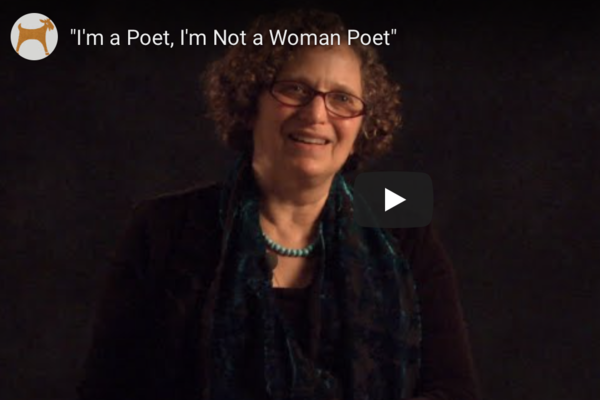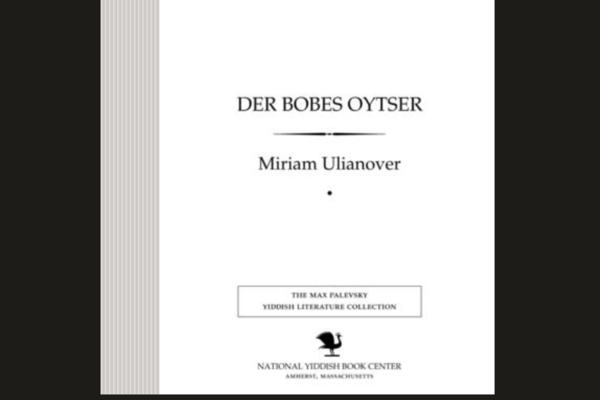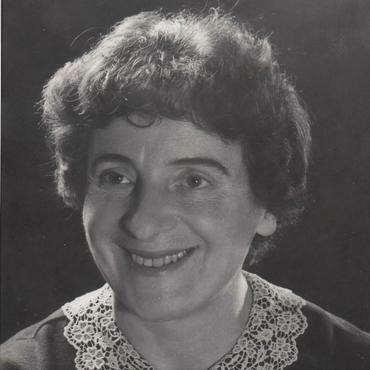
“Letters,” “To Miriam Ulinover,” and “Letters”
- Written by:
- Rivka Basman Ben-Haim and Miriam Ulinover
- Translated by:
- Kathryn Hellerstein
- Published:
- Spring 2019
- Part of issue number:
- Translation 2019
In 1922, Miriam Ulinover (Lodz, 1888-Auschwitz, 1944) published Der bobes oytser (My Grandmother’s Treasure). This collection of poems, written in the aftermath of the Great War’s violence, brings into focus the vanished world of an old woman and her small granddaughter living in a shtetl filled with tradition and faith. Utilizing a folk-like idiom and stanza form, Ulinover creates a tension between the old-fashioned wisdom of the grandmother and the losses experienced in modern times by her granddaughter. Ulinover’s poem “Brivelekh” (Letters) appears in the second half of the book Kale yorn (Bridal Years). The folksy rhymes and simple language of this poem belie the profound disappointment of a woman who receives not the long-awaited acknowledgment of her apology, nor a love-letter, but her fiancé’s complaint about the price of postage. A modernist in the guise of a naïve religious “yidishe tokhter,” Ulinover draws attention to the futility of writing and reading—to the script and the very paper, ink, envelope, and stamps, which embody the emotional costs of trying to communicate in troubled times.
Rivka Basman Ben-Haim, a Yiddish poet in Tel Aviv, first explored the form of the letter poem in her 1967 book, Bleter fun vegn (Pages/ Leaves from the Road). Her two-part poem, “Briv” (Letters), of which part 1 is translated here, addresses the American Yiddish poet, Jacob Glatstein. It tells of letters from and to the Holocaust dead, who are imagined as refugees in Gan-eyden.
On November 2, 2004, I received a letter from Rivka, with whom I’ve been friends for 20 years. Her envelope contained a treasure, a typed poem, “Tsu Miryam Ulinover” (To Miriam Ulinover), which was her response to my writing her about my translations and study of Ulinover’s poetry. Basman Ben-Haim, who herself had survived the Vilna ghetto and the Kaiserwald concentration camp, summons Ulinover back to life, where both poets, despite their differences in religiosity, share in mourning the dead and breathing together “above the abyss of the ages,” through the ever-living presence of a Yiddish poem.
—Kathryn Hellerstein
Letters
For Jacob Glatstein
They’ve been gone a long time.
Now the letters arrive.
Bashful letters,
Asking for clothes, shoes,
A Yiddish book,
A dictionary
To translate the oy
And to recite Hallel
So quietly,
They’ve been long gone.
The letters and the talk circulate,
Letters
Arriving in Paradise.
Rivka Basman Ben-Haim
To Miriam Ulinover
Good evening to you, Miriam Ulinover,
In my nocturnal home.
How I wish to distribute goodness,
As you shared it with every person
Whoever met you.
A teary joy caresses your pages
As always with us, in a smile is a tear.
Your God will not be stirred
By my silence,
We kindle millions of candles in memory,
I don’t want to make you sad
But only to welcome your coming here
And sitting with me, the two of us
Above the abyss of the ages,
Absorbing the miracle that joins us again,—
I embrace you
And breathe in Miriam Ulinover’s poems.
Rivka Basman Ben-Haim
Letters
I sent you a letter, saying
I’m aching with regret;
I’ve been waiting for your answer—
For months yet.
Finally, your letter arrives,
You write . . . you write that you’ll
Have to pay double postage,
A punishment of the mail! . . .
Miriam Ulinover
Original Yiddish published in Rivka Basman Ben-Haim’s Bleter fun vegn (Tel Aviv: Farlag Yisroel Bukh, 1967) and Miriam Ulinover’s Der bobes oytser (Warsaw, Ha-ahim Leṿin-Epshṭayn un shutfim, 1921).
KATHRYN HELLERSTEIN teaches Yiddish and directs the Jewish Studies Program at the University of Pennsylvania. Her books of translations are: In New York: A Selection (Moyshe-Leyb Halpern) and Paper Bridges: Selected Poems of Kadya Molodowsky. Her monograph, A Question of Tradition: Women Poets in Yiddish, 1586-1987 won the 2015 National Jewish Book Award in Women’s Studies and the 2015 Modern Language Association Fenia and Yaacov Leviant Memorial Prize in Yiddish Studies.



